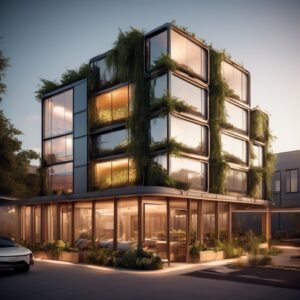The hospitality industry is constantly evolving, seeking innovative solutions to meet the growing demands of travelers while maintaining efficiency and sustainability. One such solution that has been gaining traction in recent years is modular construction. As hotels look for ways to streamline their construction processes and enhance guest experiences, modular building techniques offer a promising alternative to traditional methods. In this article, we will explore three compelling reasons why hotels should embrace building modular for new construction projects.
Speed and Efficiency
Time is of the essence in the hospitality industry, and delays in construction can result in significant financial losses and missed opportunities. One of the most significant advantages of modular construction is its ability to drastically reduce construction timelines. Unlike traditional building methods, which require sequential processes and are often subject to weather delays, modular construction involves the simultaneous fabrication of building components in a controlled factory environment. This allows for construction to proceed quickly and efficiently, with minimal disruptions.
Moreover, modular construction enables hotels to benefit from off-site fabrication, meaning that while modules are being constructed in the factory, site preparation and foundation work can be completed simultaneously. Once the modules are ready, they can be transported to the site and assembled in a matter of days, rather than weeks or months required for traditional construction. This accelerated timeline not only allows hotels to open their doors to guests sooner but also reduces construction-related expenses and minimizes the impact on surrounding communities.
Quality and Consistency
Maintaining high-quality standards is paramount in the hospitality industry, where guest satisfaction is the ultimate priority. Modular construction offers inherent advantages in terms of quality control and consistency, thanks to its factory-based production process. Unlike on-site construction, where variables such as weather conditions and human error can affect the quality of workmanship, modular construction takes place in a controlled environment, where precision and attention to detail are paramount.
Each module undergoes rigorous quality assurance processes at every stage of fabrication, ensuring that it meets the highest standards of craftsmanship and safety. Additionally, because modules are fabricated according to precise specifications and using advanced technology, hotels can expect consistency in design, materials, and finishes across all units. This consistency not only enhances the overall aesthetics of the property but also contributes to a seamless guest experience, where every room reflects the same level of quality and comfort.
Furthermore, modular construction allows for greater customization and flexibility in design, enabling hotels to tailor their properties to meet the unique needs and preferences of their target market. Whether it’s incorporating sustainable features, optimizing space utilization, or accommodating specific brand standards, modular construction offers endless possibilities for innovation and differentiation in the competitive hospitality landscape.
Sustainability and Environmental Benefits
In an era where sustainability is increasingly important to consumers and stakeholders, hotels are under growing pressure to minimize their environmental footprint and adopt eco-friendly practices. Modular construction aligns well with these objectives, offering several sustainability benefits compared to traditional building methods.
Firstly, modular construction generates less waste compared to on-site construction, as materials are precisely measured and cut in the factory, minimizing excess and leftover materials. Additionally, the controlled factory environment allows for more efficient use of resources, such as energy and water, further reducing the environmental impact of construction.
Furthermore, modular construction promotes energy efficiency and green building practices by incorporating sustainable materials and technologies into the design. From energy-efficient HVAC systems to eco-friendly insulation materials, hotels can leverage modular construction to create properties that are not only aesthetically pleasing but also environmentally responsible.
Moreover, modular construction lends itself well to renewable energy integration, such as solar panels and green roofs, allowing hotels to generate clean energy and reduce their reliance on fossil fuels. By embracing modular construction, hotels can demonstrate their commitment to sustainability and attract environmentally-conscious travelers who prioritize eco-friendly accommodation options.
Conclusion
In conclusion, modular construction represents a game-changing opportunity for the hospitality industry, offering hotels a faster, more efficient, and sustainable approach to new construction projects. From expedited timelines and enhanced quality control to greater design flexibility and environmental benefits, the advantages of modular construction are clear. As hotels strive to stay ahead in a competitive market and meet the evolving needs of travelers, embracing building modular is not just a trend but a strategic imperative for success in the modern hospitality landscape. By leveraging the innovative capabilities of building modular construction, hotels can elevate their guest experiences, optimize operational efficiencies, and pave the way for a more sustainable future.


